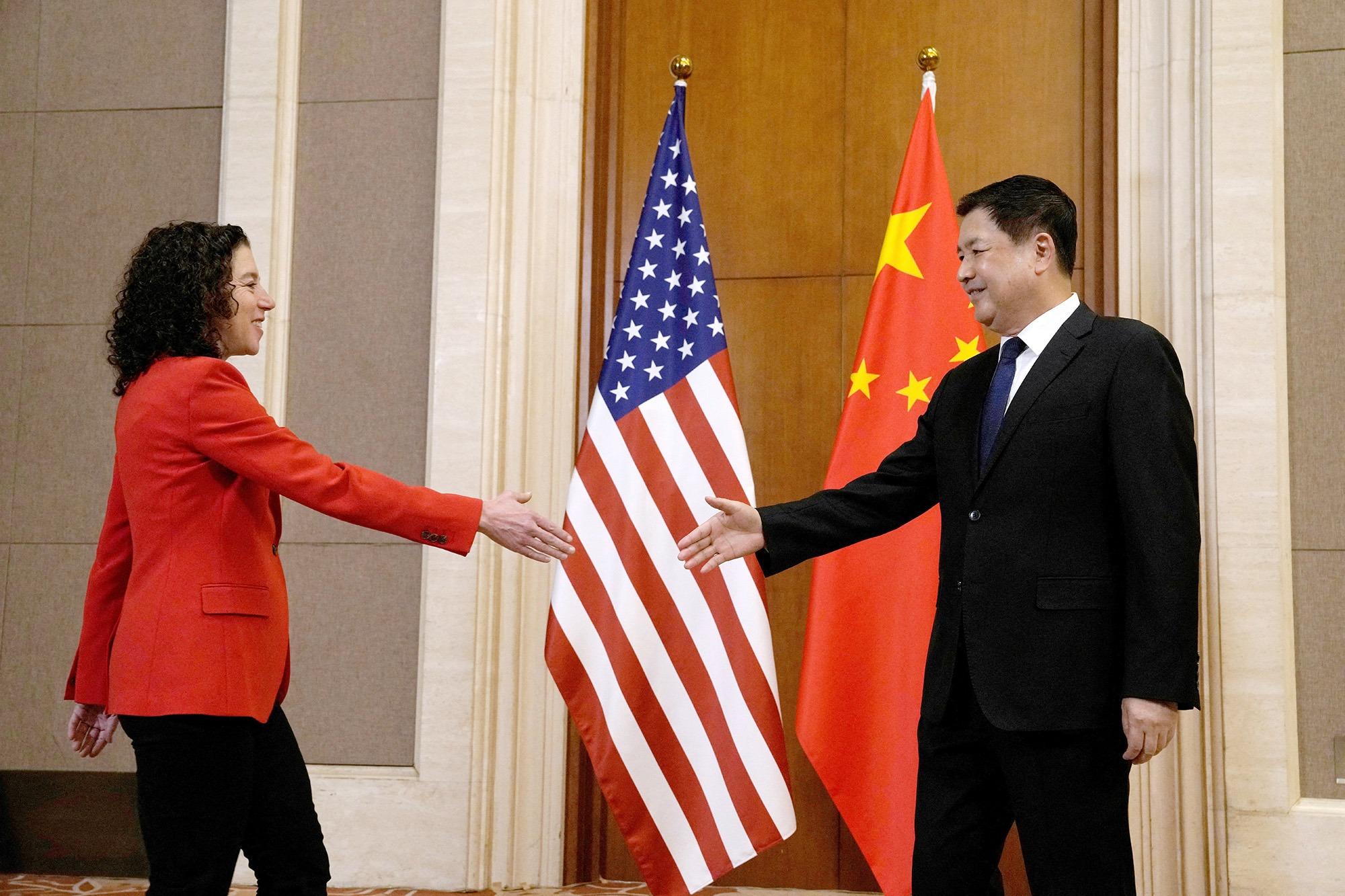China-US working group aims to improve drug control, law enforcement
 Wang Xiaohong, state councilor and director of the China National Narcotic Control Committee, greets Jen Daskal, deputy assistant to the United States president and deputy homeland security adviser, on Tuesday before their meeting at the Diaoyutai State Guesthouse in Beijing. Daskal led an interagency US delegation to Beijing for the launch of the China-US Counternarcotics Working Group. (PHOTO / REUTERS)
Wang Xiaohong, state councilor and director of the China National Narcotic Control Committee, greets Jen Daskal, deputy assistant to the United States president and deputy homeland security adviser, on Tuesday before their meeting at the Diaoyutai State Guesthouse in Beijing. Daskal led an interagency US delegation to Beijing for the launch of the China-US Counternarcotics Working Group. (PHOTO / REUTERS)
China and the United States officially launched the China-US Counternarcotics Working Group in Beijing on Tuesday, committing to practical cooperation in drug control, law enforcement and security.
Wang Xiaohong, state councilor and director of the China National Narcotic Control Committee, met with a US interagency delegation led by Jen Daskal, deputy assistant to US President Joe Biden and deputy homeland security adviser.
Wang expressed his hope that both sides would consider the important consensus reached at the meeting between their heads of state in San Francisco in November as the fundamental guideline. He emphasized that mutual respect is the way to coexistence and equality, and mutual benefit is a basic principle, urging pragmatic implementation of anti-drug cooperation.
Both sides should address each other's concerns properly and deepen cooperation on law enforcement and security, injecting more positive energy into the stable, healthy and sustainable development of China-US relations, he added.
Chen Wenxin, executive director of the China Institutes of Contemporary International Relations' Institute of American Studies, said that the inauguration of the working group is a significant measure to fulfill the outcomes of the San Francisco summit, and it reflects China's proactive commitment to international cooperation in drug control.
During the meeting between President Xi Jinping and President Biden in November, the two leaders agreed to promote the establishment of a working group on counternarcotics cooperation.
Chen noted that the issue of drug control is of great concern to the US, especially in the context of persistent challenges posed by fentanyl. The US Centers for Disease Control and Prevention estimated in May that more than 105,000 people died from drug overdoses in 2022.
Therefore, the US has strong expectations for cooperation with China in addressing this concern, he said. Following the leaders' summit in November, the US removed the Institute of Forensic Science of China's Ministry of Public Security from its entity list and lifted sanctions imposed on it.
"From the perspective of bilateral relations and the common interests of humanity, China has consistently taken substantive actions, demonstrating a high level of responsibility in the global governance arena," Chen said.
Over the years, China has emphasized the need on various occasions to deepen fentanyl governance, enhance international anti-drug cooperation, promote anti-drug cooperation with key countries and regions, and jointly crack down on transnational drug crimes, and has taken a number of practical measures.
However, in May 2020, the US Department of Commerce added the Institute of Forensic Science, including the National Narcotics Laboratory of China, to its "Entity List", bringing anti-drug cooperation to a low point.
Furthermore, in August 2022, in response to then US House speaker Nancy Pelosi's visit to China's Taiwan region, which was made despite China's strong opposition and serious representations over the trip, China announced eight countermeasures, including suspending bilateral cooperation on counternarcotics with the US.
Despite these obstacles, China has actively participated in multilateral anti-drug cooperation mechanisms such as the Shanghai Cooperation Organization and the Greater Mekong Sub-Region anti-drug cooperation mechanism, and has steadily promoted the multilateral drug control cooperation mechanism.
The country has signed 50 intergovernmental and interdepartmental cooperation documents on drug control with more than 30 countries and international coalitions, establishing annual meeting mechanisms with 13 nations, as of the end of June, according to the China National Narcotic Control Committee.
In addition, China maintains regular communication with dozens of nations and has set up border drug control liaison offices with 13 neighboring countries.
The country has listed 456 narcotic and psychotropic substances, the entire class of fentanyl and synthetic cannabinoids, and 38 precursor chemicals under control, making it one of the countries with the most and strictest drug control.
The meeting on Tuesday focused on bilateral anti-drug cooperation, including the control of precursor chemicals for drug production and law enforcement safety collaboration, representing significant progress in law enforcement cooperation between the two sides, said Chen, the executive director of the Institute of American Studies.



